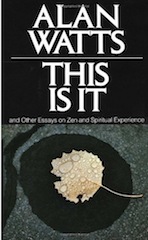 Excerpts from This Is It: and Other Essays on Zen and Spiritual Experience by Alan Watts.
Excerpts from This Is It: and Other Essays on Zen and Spiritual Experience by Alan Watts.
This — the immediate, everyday, and present experience— is IT, the entire and ultimate point for the existence of a universe. […] We use this simplest of words because we have no word for it.
The high ideals for which we are killing and regimenting each other are empty and abstract substitutes for the unheeded miracles that surround us— not only in the obvious wonders of nature but also in the overwhelmingly uncanny fact of mere existence.
Everything is as right as it can be. […] The universe, precisely as it is at this moment, as a whole and in every one of its parts, is so completely right as to need no explanation or justification beyond what it simply is.
It is usual for the individual to feel that the whole world has become his own body, and that whatever he is has not only become, but always has been, what everything else is.
The immediate now, whatever its nature, is the goal and fulfillment of all living.
The enlightenment or awakening is not the creation of a new state of affairs but the recognition of what always is.
Each thing, each event, each experience in its inescapable nowness and in all its own particular individuality was precisely what it should be, and so much so that it acquired a divine authority and originality.
Solving problems and coping with situations is by no means the only or even the chief business of life.
Nature is much more playful than purposeful, and the probability that it has no special goals for the future need not strike one as a defect.
The point of music is discovered in every moment of playing and listening to it. It is the same, I feel, with the greater part of our lives, and if we are unduly absorbed in improving them we may forget altogether to live them.
“Law of nonidentity” — “whatever you say a thing is, it isn’t.” […] (There is a world other than words) Words represent it, but if we want to know it directly we must do so by immediate sensory contact.
However much I may be impressed by the difference between a star and the dark space around it , I must not forget that I can see the two only in relation to each other, and that this relation is inseparable.
There are no such things as truths by themselves: a truth is always in relation to a point of view.
The price of intelligence as we now know it is chronic anxiety,
Imagine, a point of view, or perhaps a state of mind, which is experiential rather than intellectual— a kind of sensation rather than a set of ideas.
Let your mind alone ; let it think whatever it likes.
Thinker and thoughts are the same. […] When the dualism of thinker and thought disappears so does that of subject and object.
Man is not so much an organism in an environment as an organism-environment relationship.
Strictly speaking, there are no Zen masters because Zen has nothing to teach. […] the experience of awakening (satori) is not to be found by seeking,
One (can) not be right without also being wrong, because the two were as inseparable as back and front.
I believe that Zen appeals to many in the post-Christian West because it does not preach, moralize, and scold in the style of Hebrew-Christian prophetism.
Looking out into it at night, we make no comparisons between right and wrong stars, nor between well and badly arranged constellations. Stars are by nature big and little, bright and dim. Yet the whole thing is a splendor and a marvel which sometimes makes our flesh creep with awe.
In Zen one does not feel guilty about dying, or being afraid, or disliking the heat.
The Hebrew-Christian universe is one in which moral urgency, the anxiety to be right, embraces and penetrates everything.
The appeal of Zen, as of other forms of Eastern philosophy, is that it unveils behind the urgent realm of good and evil a vast region of oneself about which there need be no guilt or recrimination, where at last the self is indistinguishable from God.
Zen is above all the liberation of the mind from conventional thought.
“Fundamentally not one thing exists.” Things are terms, not entities. They exist in the abstract world of thought, but not in the concrete world of nature .
Ego is (a) persona or social role, a somewhat arbitrary selection of experiences with which he has been taught to identify himself.
